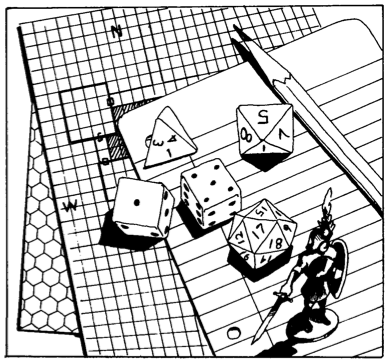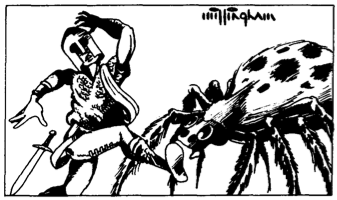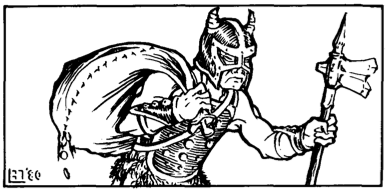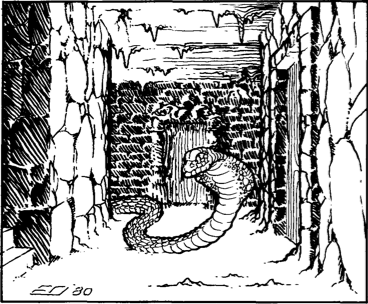Commonplace Book of OSR Quotes, Part 1

D&D is, after all, a truly unique invention, probably as remarkable as the die, or the deck of cards, or the chessboard. — J. Eric Holmes, Dragon Magazine Issue 52
One of my little habits is keeping a commonplace book. A commonplace book was essentially a medieval scrapbook; as Wikipedia puts it, commonplace books were idiosyncratic journals “filled with items of every kind: medical recipes, quotes, letters, poems, tables of weights and measures, proverbs, prayers, legal formulas. Commonplaces were used by readers, writers, students, and scholars as an aid for remembering useful concepts or facts they had learned.”
I keep my own “commonplace book” in a text file, filled with what I think are smart quotes about religion, politics, or whatever else I happen to be reading lately. And a big chunk of that is RPG quotes. Today, I thought I’d share part of my little collection with you.
Systemic blandness is, simply, a system that is neither elegant in itself, nor interesting despite not being elegant, nor charmingly inelegant. To explain: Risus is elegant in itself. It is incredibly easy to pick up, has surprising depth, and is very well thought-out. Cyberpunk 2020 is interesting despite not being elegant. It is somewhat complicated and you have to keep quite a few things in your mind as you play, but there are things in there that are genuinely interesting (the combat system, the life events system, etc.). Pre-3rd edition D&D is charmingly inelegant. In the abstract it is stupidly overcomplicated and messy, but it doesn’t matter because it could not be more charming. It is lovable. […]
I would [call] D&D 3rd edition [bland]. It ironed out all the charm from TSR-era D&D but did nothing to make it more interesting or elegant. — Noisms, On Explicating System Preference
There’s a big part of the OSR that you either grok or you don’t. Many of my D&D-playing friends simply don’t understand the aesthetic appeal of early editions of D&D.
It’s a tough nut to crack. Some of it, of course, is simple nostalgia (although I was born almost a decade after the release of Moldvay Basic). But I think it goes well beyond nostalgia, to a sense of earnestness that is missing from today’s D&D products. Today’s products are clearly the product of a team of editors, art directors, and market research staff.

D&D products of yesteryear, however, are clearly the product of one or two energetic minds and one poor, frazzled editor. That has its downsides—I’ve written before that Moldvay Basic organization is an unholy mess. But there’s also a warmth and enthusiasm (GIANT SHREW!) that fades from any product over time.
When I read early D&D editions, and look at the art, I can feel the excitement the authors still felt. Noisms nails this on a higher level: The system itself is full of effusive charm.
Dungeon Mastering is hard.

It’s a chaotic, magical, talent that is easy to learn, but maybe only really old dudes with wizard eyebrows master. I like to call when I make mistakes “fucking up”. I make mistakes to this day when I run games. — Courtney Campbell, On the Corpse of the Quantum Ogre
One of the hardest parts of DMing for me is overcoming that feeling of inadequacy that comes from reading really kick-ass play reports from, say, Patrick Wetmore. Not sure if this classic line from Courtney makes that easier or harder, but it sure rang true. Maybe the problem is that my eyebrows are simply not up to snuff.
The God that Crawls will trap your player characters. It will chase them! And it’ll kill them quick if they expect to carry out their dungeoneering business as usual.
If any of this sounds unfair, remember that “Adventurer” is defined as “one who looks for trouble,” and “Adventure” is defined as “The trouble an adventurer finds.” — James Edward Raggi IV, The God that Crawls
Raggi is divisive, and frankly I don’t feel like running any of his adventures except perhaps The God that Crawls (too deadly, too railroady). But no one has ever so pithily answered the charge that old-school lethality is simple DM brutality. It’s not (just) capricious, it’s a different set of assumptions that lead to different kinds of play.
Pathfinder and 4e are like Final Fantasy—they assume that your character is important, that their story should be coherent and morally-satisfying. They want to create fun gameplay systems, but they don’t want the game to jeapordize the tale that’s being woven.

Old school RPGs are like roguelikes, like Brogue. Your character is fragile, and while they may start out foolish they’ll either learn cleverness or end up a pile of ash. The story of an old-school character is like that of a World War 1 soldier—sad and often far too short. But if your character might be snuffed out by one mistake, the reward for careful and successful play is a feeling of immense accomplishment.
I’m not sure one of these playstyles is morally superior to the other, but I’ve played an immense amount of both Final Fantasy X and Brogue. Beating Brogue was the most satisfying gaming moment of my life, a moment built on the bones of literally hundreds of characters. The challenge fueled me and gave my choices meaning.
I quit Final Fantasy X one hour before the end.
What truly makes heroes of legend, in the end, is not what they were born with; it is what they achieve, in a risky life full of adventure, peril, and courage—and sometimes lots of trickery and guile, too. — Swords & Wizardry Core Rules, “Roll Attribute Scores”

A corollary of the above principle. New-school players often fixate on the cruddy ability scores of most “Iron Man”-generated characters. They’re missing two things. First, and critically, ability scores are marginally significant in a world that can kill even the brawniest fighter in two hits (assuming you’re running B/X or a close relative). Second, that randomly-generated ability scores are an invitation. They ask the player “What can you make of me? What kind of adventurer has 17 Charisma and 14 Wisdom, but 6 Con and 8 Dex?” There’s nothing wrong with building an ideal character via point buy, but there’s a certain magic to following the dice. After all, restrictions breed creativity.
There are unquestionably areas which have been glossed over […] We have attempted to furnish an ample framework, and building should be both easy and fun. In this light, we urge you to refrain from writing [us] for rule interpretations or the like unless you are absolutely at a loss, for everything herein is fantastic, and the best way is to decide how you would like it to be, and then make it just that way! […] We are not loath to answer your questions, but why have us do any more of your imagining for you? — Gygax & Arneson, OD&D, The Underworld & Wilderness Adventures
What can I add to my favorite quote from the game that started it all?

